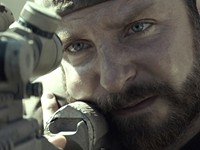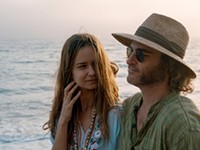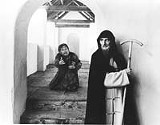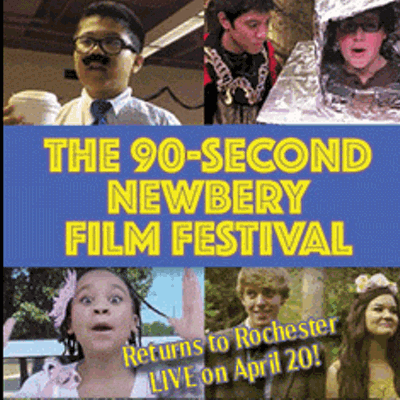[
{
"name": "500x250 Ad",
"insertPoint": "5",
"component": "15667920",
"parentWrapperClass": "",
"requiredCountToDisplay": "1"
}
]
The upcoming series of films at the George Eastman House should educate American audiences in the works of the highly praised but hardly famous Russian director Andrei Tarkovsky (1932-1986). The fact of his nationality --- how many Russian directors, aside from Sergei Eisenstein, are widely known or known at all in the West? --- his small, dense body of work, and his short life combine to make him another example of that all-too-familiar phenomenon in the world of cinema: a cult figure.
The series will showcase four Tarkovsky works, beginning with his first feature-length film, Ivan's Childhood, and ending with his most famous picture, Solaris. The four titles provide a useful and accurate overview of the director's production, displaying most of his characteristic subjects and themes, his peculiar style and structure, some of his persistent visual motifs, perhaps even those qualities that account for the documented admiration of a number of academic critics as well as the support of the sort of film buffs who haunt the museums and revival houses.
Ivan's Childhood (1962), scheduled for April 2, somewhat resembles a number of Soviet films of its era, e.g., The Cranes are Flying, in its concentration on World War II, then a fresh, gaping wound for his nation. The child of the title is a 12-year-old boy who shuttles back and forth between the Russian and German lines, risking his life to spy for his country. Tarkovsky imposes his own special narrative and structural devices on the relatively straightforward story, skipping back and forth, sometimes with sudden shocks and surprises, through Ivan's memories and dreams of a childhood cut short by war.
Though the sudden shifts in time, space, and setting occasionally disturb the narrative flow, they also foreshadow Tarkovsky's later methods in his longer and more ambitious pictures. The director often chooses to tell his stories through reveries and dreams, contrasting the reality of one world with the fantasy of another, illustrating the inner lives of his characters and, especially in the case of Ivan's Childhood, contrasting a remembered idyll of childhood, the way things should be, with the grim facts of war and death, the way things are. Despite the typically Russian sentimentality and patriotism of the film, Tarkovsky's work already indicates an unusual approach to a traditional subject.
In general, in the works that follow Ivan's Childhood, the director demonstrates a preference for elliptical rather than chronological storytelling, complicated rather than simple structures, cryptic rather than straightforward expression of theme.
His autobiographical 1974 film, The Mirror, returns to the subject of childhood through the memories and delusions of a filmmaker, obviously a surrogate for Tarkovsky himself, suffering from some unexplained illness. Jumping around in space and time, switching abruptly from character to character, interrupting its stories with other stories, providing glimpses of seemingly disconnected actions, the movie combines newsreel footage, fantasies, long silent shots broken up by puzzling conversations, a dreamy atmosphere of the past contrasted with a bleak and distressing present.
Probably the least known and most difficult of his pictures, Andrei Rublev (1966), combines the director's interests in art, childhood, and good old Mother Russia in a work that rather resembles Eisenstein's classic, Alexander Nevsky.
An epic of Russian history, with obvious allusions to its own temporal context, the immensely long, slow story presents the life of an apparently legendary medieval painter of icons, the title character, against a background of terrible violence. The Tartars invade Russia, rape and pillage for almost four hours, but ultimately the glory of Russian art and faith triumph over their unspeakable cruelty, blasphemy, and sacrilege. The black and white picture ends in a suffusion of color, showing the icons of Orthodoxy and the consequent endorsement of belief, which could hardly have pleased the Soviet censors.
The final film of the series, surely the most famous of Tarkovsky's works, is Solaris (1972), which Steven Soderbergh remade a couple of years ago, and which, despite a drastically shorter length, a Hollywood gloss, and the presence of George Clooney, bombed.
Like Andrei Rublev, Solaris constitutes something like a lifetime commitment, which translates into a great deal of time in the seats of the Dryden Theater with eyes fixed on a flickering screen --- it is not a movie for the faint of heart or the thin of derriere. A metaphysical and ontological demonstration of the construction of reality from the fabric of memory, the movie, like it or not, probably best exemplifies the dominant interests and ambitions of the director, and is just the sort of thing that fuels long, boozy discussions of a deeply philosophical sort, simply perfect for film buffs and sophomores.
Whatever his special peculiarities of style and content, Tarkovsky seems an entirely Russian director. Despite his often innovative narrative methods, his sentimentality and his long, lugubrious contemplation of empty landscapes, bodies of water, and the inevitable birch forests, place him squarely in the traditions of his nation.
At the same time, even at their slowest, dullest, and talkiest, his pictures will surprise the viewer with some stunning images --- overhead shots that enliven even commonplace actions, a crucifixion in the snow, a panoramic battle scene --- and some compelling narrative idiosyncrasies. He may not be Eisenstein, but his work occasionally recalls a moment in history when some Russian films deserved comparison with the best of European cinema.
Tarkovsky, the George Eastman House's retrospective of Andrei Tarkovsky's films, runs each Friday in April (up to April 23) at the Dryden Theatre, 900 East Avenue, at 8 p.m. Ivan's Childhood is the first film to screen, on Friday, April 2. $6. 271-3361 or www.geh.org
Latest in Movie Reviews
More by George Grella
-

Film Review: "Cake"
Jan 26, 2015 -

Film Review: "American Sniper"
Jan 19, 2015 -

Film Review: "Inherent Vice"
Jan 12, 2015 - More »





